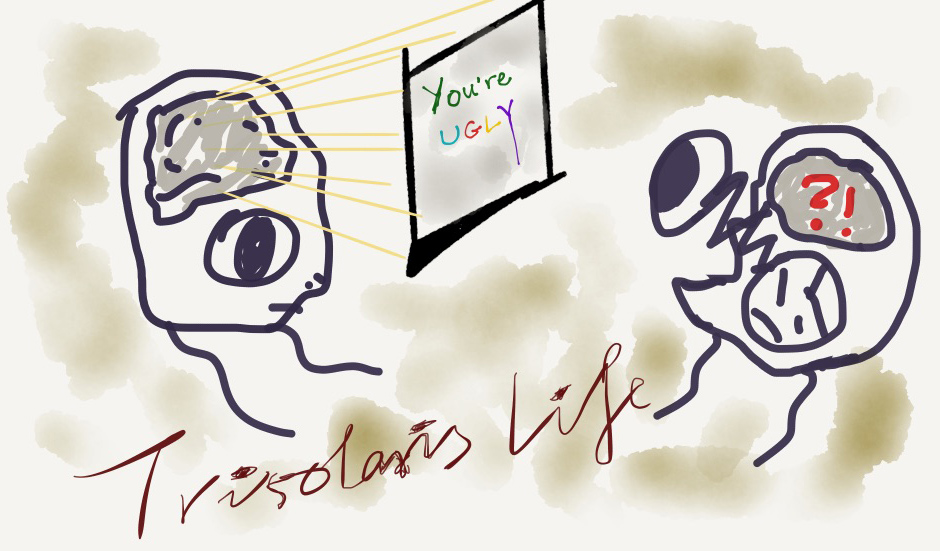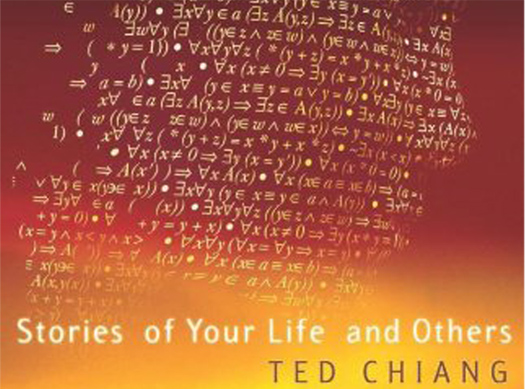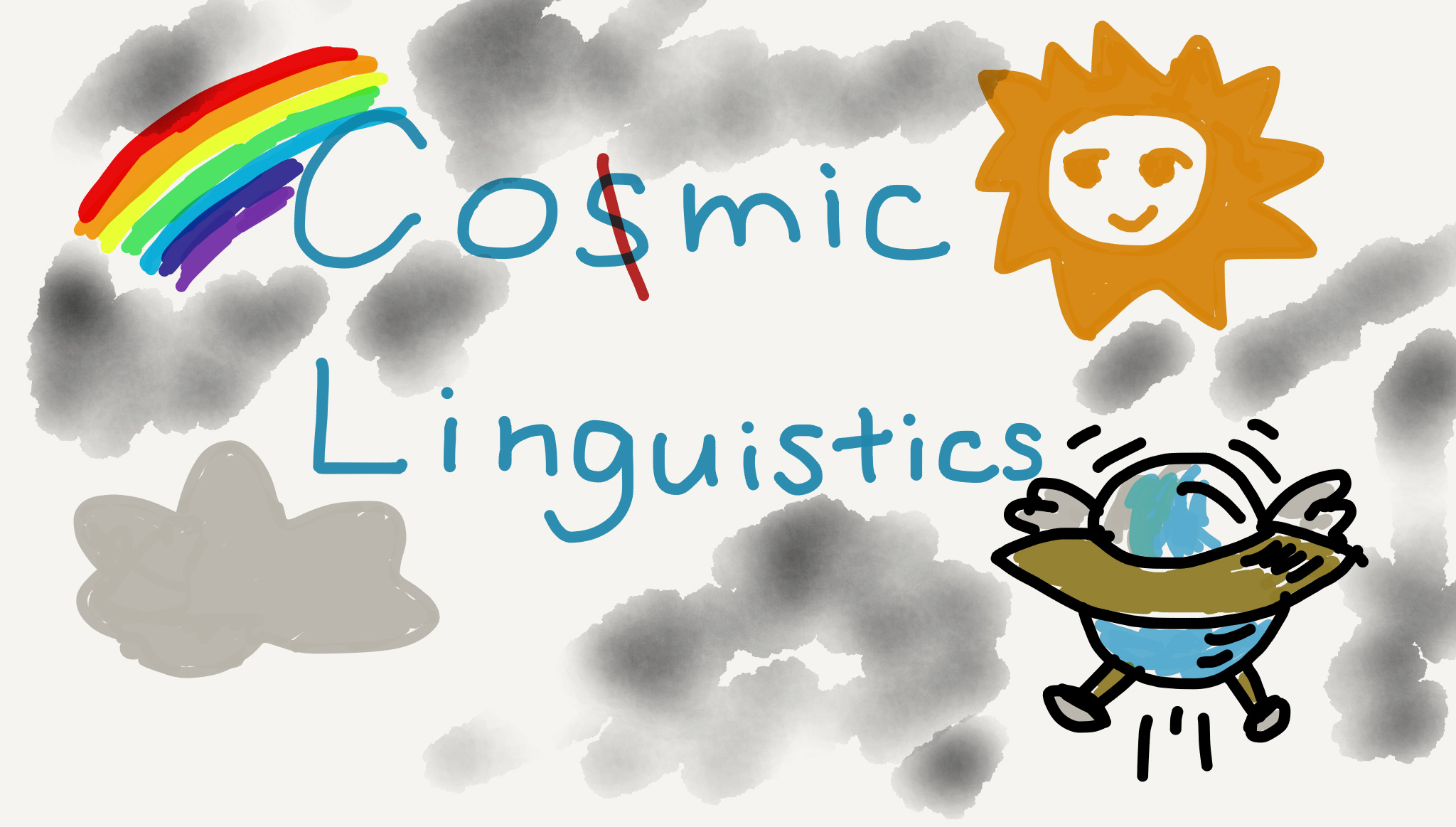In “The linguistic view in Three-Body (Part 2)” I wrote about my thoughts on some language-related settings and descriptions in my recent favorite sci-fi novel Three-Body (aka Remembrance of Earth’s Past). In this post I’ll continue my commentary.
What’s the Trisolaran language like?
Liu gives a general characterization of the Trisolaran language in Three-Body. The characterization is nowhere near as detailed as that of the Heptapod language in Story of Your Life but is informative enough for readers to get an idea.
Actually Trisolaran and Heptapod B are a bit similar—both are purely visual languages instead of written versions of oral languages. In Liu’s words (and Ken Liu’s translation), Trisolaran “wasn’t spoken or expressed by sounds” and had a “purely ideographic” writing that “had no connection to … speech” but “expressed ideas directly.” Sounds just like the big inky circles in Arrival, right?
That being said, Trisolaran and Heptapod are also hugely different. Most importantly, while Heptapods also have an oral language (i.e., Heptapod A), Trisolarans don’t. The latters’ thoughts are totally transparent to their own species instead, which sounds like telepathy to me.
Besides, Trisolarans don’t have the sort of nonlinear, teleological worldview that Heptapods have. Their perception of the physical universe is just like ours, with a unidirectional temporal dimension and much uncertainty about the future. In fact a large part of the first book (The Three-Body Problem) is about the torture this uncertainty had inflicted on the Trisolaran civilization.
Liu explains why the Trisolaran language doesn’t have a spoken form in The Dark Forest via an interstellar “online chat” between a human and a Trisolaran. The Trisolaran was confused by a pair of words in Earth language, think and say. For Trisolarans these were synonyms, so they couldn’t understand why humans needed both.
It turned out that Trisolarans had no organs of communication like the human mouth or the Heptapod top orifice. Their brains could directly “display … thoughts to the outside world” instead, by “emit[ting] electromagnetic waves” that were strong enough to be “directly received by [conversing] counterparts” in the form of visible light. So, for Trisolarans thinking = speaking.

As such, I can’t really say which alien language is more alien to us, Trisolaran or Heptapod B. But one thing is certain: they are both much more alien than Klingon!
I’ve read both Three-Body and Story of Your Life, and my overall impression is that Chiang has a much deeper understanding of linguistics than Liu and had also thought more thoroughly about alien language design. But again, that may be because Story of Your Life is a language-themed work while Three-Body isn’t. So, I’d give Liu’s imagination of the Trisolaran language 4 stars out of 5 (not 5 stars because I wish he had specified more detail).
Rating: ★★★★☆
Linguisticians on the team
Another similarity between Three-Body and Story of Your Life is that they both proudly recruit linguisticians into space exploration teams, which seldom happens in the sci-fi realm or in real life. Linguisticians were recruited twice in the trilogy—both in Death’s End—once in the eye-opening exploration of the four-dimensional ring and once in the urgent interpretation of three fairy tales that could determine humanity’s fate.
The ring team had three members, a cosmologist and main character, a science officer who had previously entered four-dimensional space, and a linguistician who had previously studied the Trisolaran language. Unsurprisingly, it was the linguistician (Dr. West) who made the right interpretation of the initial messages from the ring and suggested the correct next move (i.e., feeding the ring with Earth language tutorial).
The fairy tale team, on the other hand, had a lot more members and actually formed an entire linguistics squad—to decipher the meaning of a mysterious recurring name. The member who successfully figured it out was an expert in diachronic comparative linguistics (named Palermo). However, Liu points out that Palermo’s success was “due to an unexpected stroke of good luck” and “had little to do with his professional expertise” (Ken Liu’s translation). It had more to do with his girlfriend’s expertise in Norwegian history instead…
This is again reminiscent of Story of Your Life, where the linguistician Dr. Banks’ successful deciphering of Heptapod B was crucially dependent on her physicist boyfriend’s mentioning of an optic principle (i.e., Fermat’s principle of least time). Interdisciplinary collaboration is important!
Overall, I’d give Liu’s portrayal of linguisticians in Three-Body 4 stars out of 5. I wish there were a bit more “hard linguistics” (like that on the cover of Ted Chiang’s book) in the plot!
Rating: ★★★★☆

Cosmic Sociology and Cosmic Linguistics
Finally, in The Dark Forest Liu proposes (through Luo Ji) a brand new discipline Cosmic Sociology, of which the dark forest theory is an important part. On reading this, I couldn’t help wondering whether Liu would also support the discipline “Cosmic Linguistics.”
He probably would given the importance he’s attached to language and linguistic knowledge throughout the non-language-themed novel, but I guess against the background of Three-Body the real question is, What disciplines should higher education in an interstellar era involve?
Many subjects would have a new, “cosmic” version for sure, just like Cosmic Sociology. And as soon as we make the first extraterrestrial friends, the need of a cosmos-level linguistics discipline would also realistically arise. This message has been very well delivered in Arrival.
On the other hand, if future humans decide to follow the dark forest theory and hide themselves from extraterrestrial listeners, then none of the “cosmic” subjects would come into being. Since we are not Heptapods and can’t see through the future, this eventually boils down to an ideological issue.

The inherent ideological conflicts in humanity is portrayed multiple times in Three-Body; for example, when humans needed to decide whether or not to establish the first interstellar contact, when we needed to decide whom to give the power of exposing ourselves to the outer space should there be a Trisolaran invasion, and when we needed to decide how to protect Earth from dark forest attacks.
Ironically, quite a few crucial decisions made by humans in the novel were the worst choices, and multiple protagonists on the right side of history weren’t given a chance to decide. Till this day I still wonder why Liu has arranged such a pessimistic destiny for humanity, though I’d give his idea of cosmic subjects 5 stars out of 5 regardless. It’s brilliant!
Rating: ★★★★★
So, above are all my comments on the linguistic view in Three-Body. Hope you’ve enjoyed the reading and are now more fascinated by language—the lighthouse of civilization. And do give the trilogy a read if you haven’t done so. You won’t be disappointed! 😃



Leave a comment